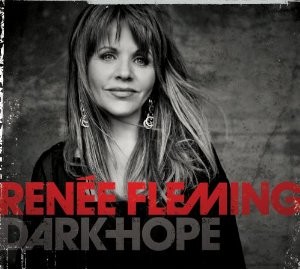
Knock-out soprano Renée Fleming will release her new pop album, Dark Hope, on June 8 in the United States. Already out in Europe, the album represents the underside of Fleming’s newest leaf: popular music.
Her classical credits bud with acclaimed performances in the world’s best opera houses, multiple solo albums, and the moniker of “America’s Favorite Soprano.” None of this, however, receives a mention in the liner notes of her new release. Instead, Fleming wants to earn her alt-rock plaudits with a breathy, alto-range timbre that reflects little of her previous professional exploits. That tone, though antithetical to her pure, operatic upper register, is a tool she carefully crafted to convey an authentic pop feeling. Fleming and her producers have consistently asserted that the album is not a “crossover” but a purebred rock/pop release. The difference, they stress, is that a crossover album is classically styled performances of popular songs. Fleming’s recording is pop covers of pop songs.
The approach seems similar to the classical tradition in that Fleming plays the role of performing artist. She embraces the popular works of current artists and interprets them through her own musical lens, much like an artist performing a piece by a venerated composer. The single “Endlessly,” by Muse, is currently the only song on Dark Hope that has been released in the United States. It is available via iTunes.
The performance is reminiscent of the original in all the right ways: tempo, style, and yearning are all there. However Fleming’s own take on the song is evident in her phrasing. Through her choice of emphasis, she tells a different story than does Muse’s Matt Bellamy. Her female artistry contrasts with Bellamy’s and contributes to her reboot of “Endlessly.”
The only fault I found was with the instrumentation. Muse uses a delicate balance of drum set, piano, and synth to propel the otherwise andante threnody. But Fleming’s iteration, while not lethargic, is more subdued. The strings are effective but synthesized, and therefore cannot provide the same rich, varied sounds as a live instrument. Muse’s original does use heavy synth, but the sounds are overtly electronic as opposed to instrumental representations. Simply put, synth instruments cannot adequately complement a voice like Fleming’s. I do look forward to hearing the rest of the album, given the incredible talent and musicality that is evident on this single.
Related Articles:
New York Times review by Anthony Tommasini
New York Times review by Jon Pareles
"News related to the modern world of classical music."






[…] also a new voice for her popular debut. See The Sound Post’s review of the single Endlessly here, and click through to watch the CNN interview with Ms. […]